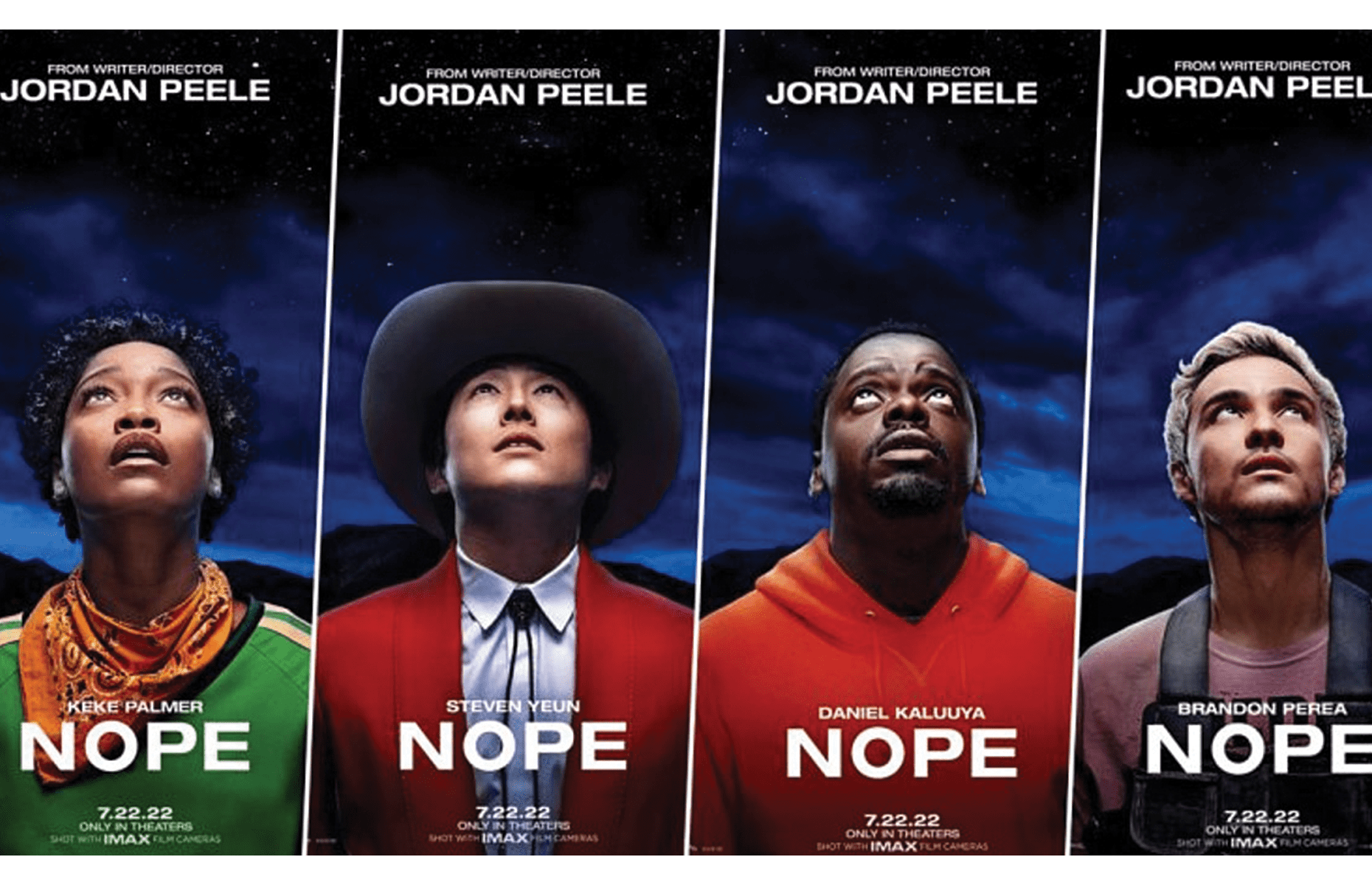‘I will cast abominable filth upon you, make you vile, and make you a spectacle.’
There’s no better way to set the tone than with a doomsaying Biblical verse. Nahum 3:6 condemns Assyria’s capital Nineveh, a “city of blood, full of lies, full of plunder, never without victims”. The verse deplores exploitation and idolatry as pathways to death and destruction. In NOPE, Jordan Peele (Get Out, Us) casts a similar judgement on America.
OJ (a coolly laconic Daniel Kaluuya) and Emerald Haywood (the charismatic Keke Palmer) run a family business – Haywood Hollywood Horses. Their claim to fame? They say that their great-great-great grandfather was featured in the first ever moving picture, an 1878 video of an unknown black man riding a horse.
After their father is killed by a nickel falling from the sky, Emerald and OJ grow suspicious. They line their ranch with cameras, enlisting jittery tech guy Angel (Brandon Perea, whose penchant for comic relief is sometimes overstated) in an effort to capture something OJ saw from the corner of his eye. Emerald anticipates an “Oprah shot” of a UFO, which would finally give the Haywoods their Hollywood recognition.
The film mingles genres: sci-fi; horror; Western; comedy. Its setting in the arid Californian hills contrasts with the number of night sequences, but cinematographer Hoyte van Hoytema (Interstellar, Ad Astra) shoots the celestial unknown with grace and scope.
Scope is a preoccupation of the movie, both literally and metaphorically. Jordan Peele said of NOPE, ‘I wrote it in a time when we were a little bit worried about the future of cinema…so the first thing I knew is I wanted to create a spectacle.’ He does exactly this, while in a self-reflexive way both celebrating filmmaking and condemning American society’s obsession with capturing traumatic moments for profit.
The first third of the movie is especially puzzling; Peele throws ideas and images at the audience without much context, and at times the radically original writing and eclectic imagery make it difficult to appreciate what’s being done. This is when the movie is at its most convoluted; it feels like an inconsequential mess of movie references and entangled plots. But it gets better (sort of).
Peele treats the theme of exploitation with dexterity. It slips through his fingers now and again, but nobody can accuse this movie of being ill-conceived. On one hand, Peele celebrates African Americans taking control of and rightfully profiting off their own stories, but he counteracts this with the hubristic tale of Ricky “Jupe” Park, played by Minari and The Walking Dead star Steven Yeun.
Jupe runs a kitschy Western amusement park down the road from the Haywoods. At Jupiter’s Claim funpark, cowboy inflatables and rearing horse statues clash with alien and UFO memorabilia. Jupe’s new hustle, the “Star Lasso Experience”, involves wowing people by luring whatever is terrorising the valley using the Haywood ranch’s horses. Murmuring “You’re chosen” to himself, it’s clear Jupe believes he’s formed a spiritual bond with an alien race he calls ‘The Viewers’. After a traumatic event in his childhood involving a rampaging chimp sparing his life, Jupe thinks he’s special, chosen by a divine force. Sadly not. The Star Lasso Experience goes belly-up in a brutally claustrophobic and visceral scene.
After an 80s-style montage of the protagonists’ grand plan to shoot the entity, Peele makes it clear that he can pull off one hell of a sci-fi action sequence in a symphonic ode to Spielberg and the classic American UFO story. What we end up seeing of the UFO is strangely beautiful and symbolic of humanity’s domineering of the natural world.
The film mounts a critique of sensationalist and exploitative culture, but it feels a little Americentric. Shock-value tabloid publications like TMZ (which gets a shoutout in an absurdly exaggerated scene) and WorldStarHipHop are rife in America, but that’s where they seem to hold all of their cultural capital. What results is a bit of dissonance between the heft of Peele’s themes, their depiction and the level of audience concern.
Once the film ends, the title has a lot more significance. NOPE stands for many things. Peele says “Nope” to white commandeering of African American stories, to exploiting trauma, to growing complacent with our power over nature. Also, the cast spent the film’s press run debunking this one but it’s too good to not include: N.O.P.E. Not Of Planet Earth.
NOPE has quite a bit to offer. If you want to theorise about layered intentions and messages, the movie lends itself to rewatches – hidden details reveal themselves in unexpected places. If you want to experience a radically original movie unlike anything you’ve seen, book yourself a ticket. But if you just want to kick back and enjoy some comic chemistry while watching some crazy stuff happen on a big screen, this movie will do it for you too.
NOPE is in cinemas now.





